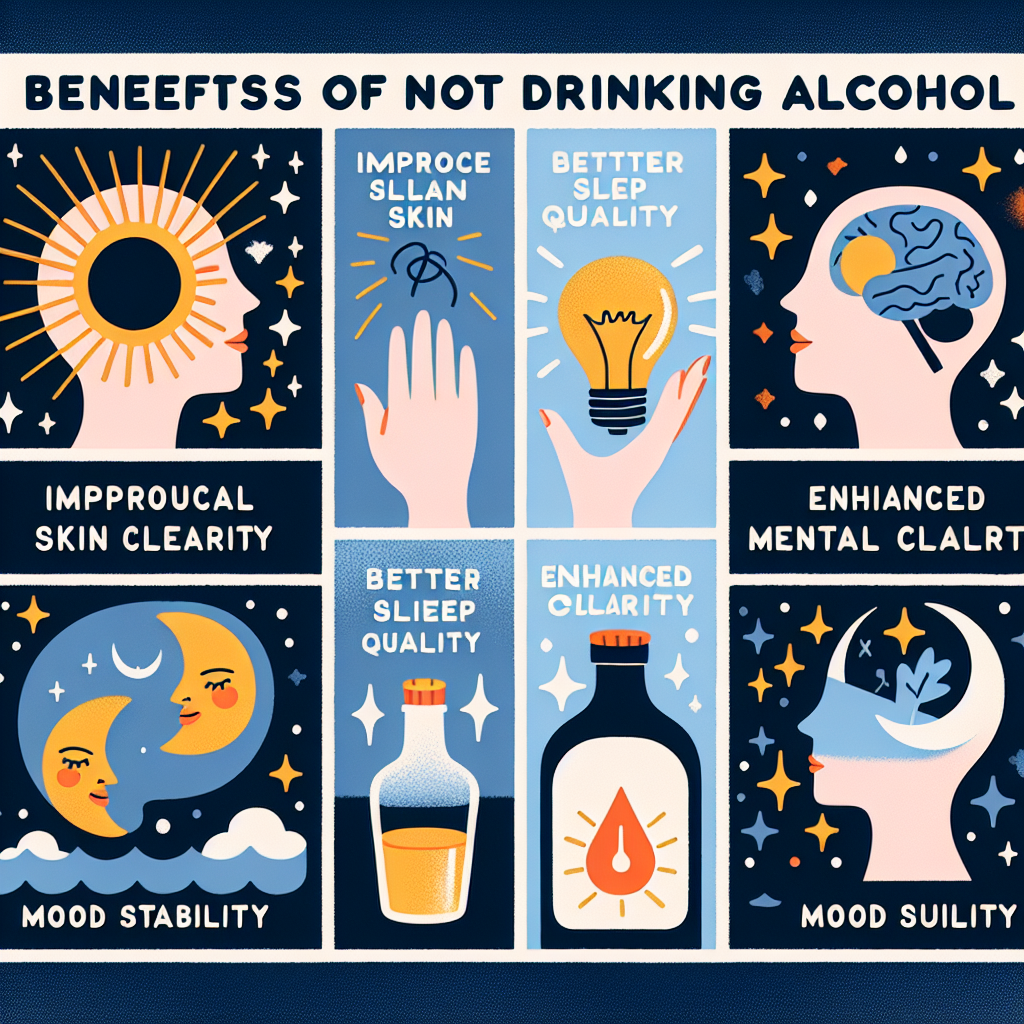-
Table of Contents

“Unlock a Healthier, Happier You: Discover the Benefits of Going Alcohol-Free!”
Introduction
When you stop drinking alcohol, numerous benefits can positively impact your physical, mental, and emotional well-being. Physically, you may experience improved liver function, better sleep quality, and enhanced immune system performance. Mentally, abstaining from alcohol can lead to clearer thinking, reduced anxiety, and improved mood stability. Emotionally, you might find increased self-esteem, better relationships, and a greater sense of control over your life. Additionally, stopping alcohol consumption can lead to financial savings and a lower risk of developing alcohol-related health issues, such as heart disease and certain cancers. Overall, the decision to stop drinking alcohol can lead to a healthier, more balanced, and fulfilling life.
Improved Physical Health: The Benefits of Quitting Alcohol
When you decide to stop drinking alcohol, the benefits to your physical health can be profound and far-reaching. One of the most immediate changes you may notice is an improvement in your sleep patterns. Alcohol can disrupt your sleep cycle, leading to poor-quality rest and fatigue. By eliminating alcohol, you allow your body to achieve deeper, more restorative sleep, which in turn enhances your overall energy levels and mental clarity.
In addition to better sleep, quitting alcohol can lead to significant improvements in your liver health. The liver is responsible for metabolizing alcohol, and excessive consumption can lead to conditions such as fatty liver, hepatitis, and even cirrhosis. When you stop drinking, your liver has the opportunity to repair itself and regenerate healthy tissue, reducing the risk of long-term damage and improving its overall function.
Moreover, your cardiovascular health can also benefit from abstaining from alcohol. Heavy drinking is associated with high blood pressure, cardiomyopathy, and an increased risk of heart attack and stroke. By cutting out alcohol, you can lower your blood pressure and reduce the strain on your heart, leading to a healthier cardiovascular system. This can also contribute to a lower risk of developing heart disease, which is one of the leading causes of death worldwide.
Another significant benefit of quitting alcohol is weight management. Alcoholic beverages are often high in calories and can contribute to weight gain. When you stop drinking, you eliminate these empty calories from your diet, making it easier to maintain a healthy weight. Additionally, without the influence of alcohol, you may find it easier to make healthier food choices and stick to a balanced diet, further supporting your weight management goals.
Your immune system also stands to gain from giving up alcohol. Chronic alcohol consumption can weaken your immune response, making you more susceptible to infections and illnesses. By quitting alcohol, you can strengthen your immune system, allowing your body to better defend itself against pathogens and recover more quickly from illnesses.
Furthermore, your digestive system can experience positive changes when you stop drinking. Alcohol can irritate the lining of your stomach and intestines, leading to issues such as acid reflux, gastritis, and ulcers. By eliminating alcohol, you reduce this irritation and allow your digestive system to function more efficiently. This can result in fewer gastrointestinal problems and an overall improvement in your digestive health.
In addition to these physical health benefits, quitting alcohol can also have a positive impact on your skin. Alcohol dehydrates your body, which can lead to dry, dull skin and exacerbate conditions such as eczema and rosacea. When you stop drinking, your skin can become more hydrated and radiant, and you may notice a reduction in skin issues.
Finally, it’s important to recognize that the benefits of quitting alcohol extend beyond just physical health. Improved physical well-being often leads to enhanced mental and emotional health, creating a positive feedback loop that can significantly improve your overall quality of life. By taking the step to stop drinking, you are investing in a healthier, happier future for yourself.
Enhanced Mental Clarity: How Stopping Alcohol Boosts Cognitive Function
When you decide to stop drinking alcohol, one of the most profound benefits you may experience is enhanced mental clarity. This improvement in cognitive function can be life-changing, offering a clearer, sharper mind that can better navigate the complexities of daily life. The journey to sobriety is often challenging, but the rewards, particularly in terms of mental clarity, are well worth the effort.
Initially, it is important to understand how alcohol affects the brain. Alcohol is a depressant that impairs the central nervous system, leading to slowed reaction times, impaired memory, and reduced cognitive function. Chronic alcohol consumption can exacerbate these effects, resulting in long-term cognitive deficits. However, when you stop drinking, your brain begins to heal, and the fog that once clouded your thoughts starts to lift.
One of the first changes you may notice is an improvement in your memory. Alcohol disrupts the brain’s ability to form new memories, which is why heavy drinking often leads to blackouts or memory lapses. When you eliminate alcohol from your life, your brain’s hippocampus, the region responsible for memory formation, starts to recover. This recovery process can lead to better retention of information and an enhanced ability to recall past events.
Moreover, stopping alcohol consumption can significantly improve your concentration and focus. Alcohol impairs the brain’s prefrontal cortex, which is responsible for decision-making, problem-solving, and impulse control. As you abstain from alcohol, this part of your brain begins to function more efficiently, allowing you to concentrate better on tasks and make more thoughtful decisions. This newfound focus can enhance your productivity and help you achieve your goals more effectively.
In addition to memory and concentration, quitting alcohol can also boost your overall mental health. Alcohol is often used as a coping mechanism for stress, anxiety, and depression, but it ultimately exacerbates these conditions. When you stop drinking, you may initially experience heightened anxiety or mood swings as your body adjusts. However, over time, your brain chemistry stabilizes, leading to improved mood and reduced anxiety. This mental stability can provide a solid foundation for personal growth and emotional resilience.
Furthermore, enhanced mental clarity can lead to better sleep quality. Alcohol disrupts the natural sleep cycle, leading to poor sleep quality and daytime fatigue. When you stop drinking, your sleep patterns begin to normalize, allowing you to experience deeper, more restorative sleep. This improved sleep quality can have a cascading effect on your overall well-being, as a well-rested mind is more alert, creative, and capable of handling daily challenges.
As you continue on your journey of sobriety, you may also find that your relationships improve. Clearer thinking and better emotional regulation can lead to more meaningful and effective communication with loved ones. You may become more empathetic and understanding, fostering stronger connections and a more supportive social network.
In conclusion, the decision to stop drinking alcohol can lead to significant improvements in mental clarity and cognitive function. From enhanced memory and concentration to better mental health and sleep quality, the benefits are numerous and far-reaching. While the path to sobriety may be challenging, the rewards of a clearer, sharper mind are invaluable. Embracing these changes can lead to a more fulfilling and empowered life, inspiring you to continue on your journey with renewed purpose and determination.
Q&A
1. Improved Physical Health: Stopping alcohol consumption can lead to better liver function, lower blood pressure, and reduced risk of heart disease and certain cancers.
2. Enhanced Mental Well-being: Quitting alcohol can improve mood, reduce anxiety and depression, and lead to better sleep quality.
Conclusion
Stopping alcohol consumption can lead to numerous health benefits, including improved liver function, better cardiovascular health, enhanced mental clarity, and reduced risk of certain cancers. Additionally, individuals often experience better sleep quality, weight loss, and improved mood and energy levels. Social and financial benefits also arise from reduced spending on alcohol and fewer alcohol-related conflicts. Overall, quitting alcohol can significantly enhance both physical and mental well-being, leading to a healthier and more balanced lifestyle.



